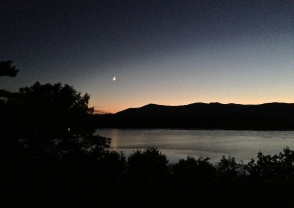I met, if met is the right word, my wife on the online dating site OKCupid.
After returning from a long trip to Germany and Finland, during which while hiking and semi-lost on the frozen landscape of Arctic Lapland I realized that a former heartbreak had been lifted, I created a profile on OKCupid to re-enter the world of possible romance. I was attracted to the site because of the endless number of questions one could answer, strengthening the possibility that the algorithm could uncover the ideal match. Surely such wide ranging and personal questions, if answered honestly and in great numbers, would discover that perfectly matched person who would be so in sync with my values and desires that my earlier mistakes of hope clouding reality might be eliminated.

The result was overwhelming. Dozens of women messaged me. All were in the 90-100% match range. While flattering, I assumed that being a straight, employed, fit, reasonably decent looking guy in my age range in San Francisco might be, if not a rarity, at least an attractive proposition to the many single women in the city. I answered none of the messages, “liked” none of the possible matches the site served up by the hundreds. It was all too much.
Until one day I received a message that responded specifically to what I had written in my profile about my love of swimming and books. On top of that OKCupid said we were a 99% match. I answered the message and began a month long email correspondence that only deepened my expectation that an ideal match might be possible.
At the time I was traveling back and forth to New York for work, alternating two weeks there with two weeks back in San Francisco. This delayed meeting my new online friend. When the time finally came, she suggested we meet in front of the South End Rowing Club and go for a walk along Crissy Field. Here the algorithm succeeded beyond its possible calculated knowledge. How could it have known that I had been a recent member of the adjacent Dolphin Swimming and Rowing Club, very likely standing next to this woman on the small common beach between the two clubs, swimming in the same water, enjoying the same open water experience that had sparked the match in the first place?

More dates followed. A match had been made. I proposed. She accepted. My best friend Josh married us at Green’s on October 18, 2014. We were an OKCupid poster couple.
How would I know that some four years later my wife would dissolve our marriage, telling me she no longer loved me, hadn’t loved me for nearly three years, confirming what we both knew—but that I suppressed—that our marriage had been a disappointment.
A few days ago I re-registered on OKCupid, not to renew a search for another match—never that route again!—but to remind myself of the kinds of questions the site posed, and to see if I could locate my old results. I couldn’t backtrack, but answering the questions again has been insightful. So far I’ve answered again over a hundred questions, and already am being deluged with likes and messages. I need to turn this off, but in the meantime seeing the algorithm at work is revealing if only cold comfort.
My wife and I were indeed well matched on all the kinds of questions I’m answering again. Similar political views; nonbelievers; nonsmokers; moderate or non-drinkers; similar attitudes towards sex, exercise, diet, fitness, dogs and cats.
I haven’t come across a question, though, to the effect of “What is your view of marriage?” Or “How much togetherness is too little, too much?” “Is it important to please your partner?” “Is marriage a shared destiny, or two independent destinies?” “Are we now on one road or two in life?” “How much affection is appropriate in a marriage?” “Is our love possible?”
These latter were the essential unanswered questions that doomed our marriage. Our visions of marriage turned out to be profoundly different. Our ideas of compromise, compassion, and commitment proved to be different.
She withdrew her affection and I persevered believing what I had was good enough. I was too much and she was too little. I believed married people trudged the happy road of destiny together. She believed in two roads, two destinies.
When the crisis hit, I wanted to try to work things out, see a couple’s counselor, resolve issues and differences. She said no. She said had we more equity—more time together as a couple– perhaps she might have been willing to try. Later she told me it would have been futile, at least from her perspective, that our fundamental outlooks, our needs and desires, our ideologies, were too dissimilar. There would always be compromise. One of us would always be unhappy.
I reluctantly agreed.
OKCupid failed to identify those core belief systems that give deep meaning to a relationship, that establish a foundation for a lasting bond and true marriage of shared joy. It failed to define happiness.
We had shared happiness for a while. I know we did, that it was real. It disappeared too quickly, the fractures becoming evident within a year.
It makes me deeply sad.
Could I have been different? Could there have been a different outcome, a different destiny? I’ll never know.
I’m reminded of the lovely, bittersweet song by Ivor Novello, The Land of Might Have Been:
Somewhere there’s another land
Different from this world below
Far more mercifully planned
Than the cruel place we know
Innocence and peace are there
All is good that is desired
Faces there are always fair
Love grows never old or tired
We shall never find
That lovely land of might-have-been
I can never be your king
Nor you can be my queen
Days may pass and years may pass
And seas may lie between
We shall never find
That lovely land of might-have-been
Sometimes on the rarest nights
Comes the vision calm and clear
Gleaming with unearthly lights
On our path of doubt and fear
Winds from that far land are blown
Whispering with secret breath
Hope that plays a tune alone
Love that conquers pain and death
Shall we ever find
That lovely land of might-have-been?
Will I ever be your king
Or you at last my queen?
Days may pass and years may pass
And seas may lie between
Shall we ever find
That lovely land of might-have-been?








